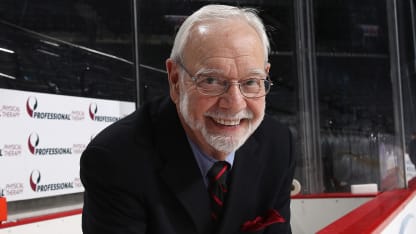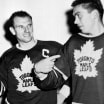Fischler's passion as broadcaster, writer led to U.S. Hockey Hall of Fame
'Maven' spread love of game, mentored others to launch own careers

Then came the rain, the decision, the hockey, the falling in love.
It was 1939 and Stan Fischler was 7. His father had promised him a trip to see "Snow White and the Seven Dwarfs" at the Globe Theater in New York. It was a Sunday, a fact that slips easily off Fischler's tongue, even 82 years later. But it was pouring by the time they got off at their subway stop at 50th and Eighth and, with no umbrella, Fischler's father pivoted.
They would go to a hockey game at Madison Square Garden, a half block away, instead. Fischler cried.
But it was the decision that would alter the course of his life, leading to his induction into the U.S. Hockey Hall of Fame on Thursday along with Paul Holmgren and Peter McNab as the Class of 2021. The Class of 2020 -- Dean Blais, Tony Granato, Jenny Potter and Jerry York -- will be inducted at the same time after the 2020 ceremony was postponed by the coronavirus pandemic.
"I remember saying after that, let's go to a hockey game every Sunday," Fischler said. "And I never stopped going."
It was in that introduction to hockey that Fischler -- known as "The Maven" -- found a passion that would become the work of a lifetime, an ode to the game that has lasted through more than 100 books on the subject, a career in newspapers and a career in broadcasting, culminating in the 2007 Lester Patrick Trophy for outstanding contributions to American hockey.
"The Lester Patrick was like getting my Bachelor's degree from Brooklyn College and the U.S. Hockey Hall of Fame was like getting my master's in hockey," Fischler said. "In each case, I shook my head in disbelief. I said, 'What am I getting an award for what's been my life's work, my labor of love?'"
Fischler began his hockey career when he was hired to write about the Eastern League while at Brooklyn College, before taking a job as the assistant publicist with the New York Rangers.
"All these things were adding up to doing hockey for the rest of my life," Fischler said. "What could be better than this? I not only didn't have to pay to see every game, I was getting paid for it."
He moved on to the New York Journal-American from 1955 to 1966 and from there to freelance work, to books, to the New York bureau of the Toronto Star, which he ran until 1977.
Fischler moved into the broadcast booth, despite an admitted "utter disdain for TV people," as he put it.
That soon changed.
Starting with the Hartford Whalers, and moving on to the Rangers, Islanders and New Jersey Devils, Fischler found a home in the booth, where he would remain for more than 40 years before retiring after the 2017-18 season.
"He was innovative, creative," said Jiggs McDonald, a broadcast partner for 15 seasons. "There was never, 'Oh, I don't think we can do that.' Never heard the man say that anything was impossible on the broadcast end of things."
It was a job metamorphosis that Fischler had not foreseen or intended, but one he attacked with gusto, becoming a fixture in the booth, especially for the Islanders, and adding his signature brand of humor to production meetings and tidbits to broadcasts.
He continued, as always, to write.
But as much as Fischler's impact is felt in the words he's written, it's also been felt in the lives he's touched, especially through his mentorship, something that makes him endlessly proud.
"I don't think everybody recognizes just how big a heart and how giving this man is, has been and continues to be," McDonald said. "And caring. Caring. Stan has time for everybody. He'll take the time to talk. … He had the respect of anybody I've ever run across on the playing field."
His interns include luminaries like Frank Brown, who received the Elmer Ferguson Memorial Award and was inducted into the Hockey Hall of Fame in 2019 for his work with the NHL's communications department and at the New York Daily News, and Jessica Berman, now the Deputy Commissioner at the National Lacrosse League, the highest-ranking female executive in a men's sport. Berman was formerly the Vice President, Community Development, Culture and Growth at the NHL.
"He introduced and helped so many people get involved in writing careers, broadcast careers in some cases as well," McDonald said. "He has a heart of gold. A heart bigger than that body of his. He's an incredible human being."
Brown recalled the early 1970s, when he was interning for Fischler in his apartment, "where every inch of every room seemed filled with hockey clippings, hockey books and hockey stuff," as Brown wrote in an email.
One day, Fischler handed over a scrap of paper with a phone number scrawled on it.
It belonged to Gordie Howe.
"I want you to call [Howe] and get his opinion on some issue of the day," Brown said of the instructions from Fischler. "'But Stan. I'm just a kid,' I replied. 'Why would Gordie Howe talk to me?' 'You're a member of the media,' Stan snapped. 'Why wouldn't he talk to you?'"
It was a gift that Fischler gave Brown, and others, an invitation to be a part of the hockey world that he so cherished, a boost into a profession not always kind, a push that, as Brown said, taught him to go for it.
Because why shouldn't he?
With Fischler, the impossible was possible. He supported his wife, Shirley, as she broke barriers and became the first woman to report from the press box at Madison Square Garden. He continues to write The Fischler Report now, at 89.
"I have gotten to be 89 years old thanks to hockey," Fischler said. "Hockey has kept me going."
He has done the same for hockey, helping to push it forward. Through the years, Fischler has brought the game to a wider audience and shared his love of it with the world.
"The game wouldn't be where it is in 32 different markets if Stan hadn't had a role to play," McDonald said. "He was a promoter. … I'm thrilled that the U.S. Hockey Hall of Fame has seen fit to honor him like this."

















